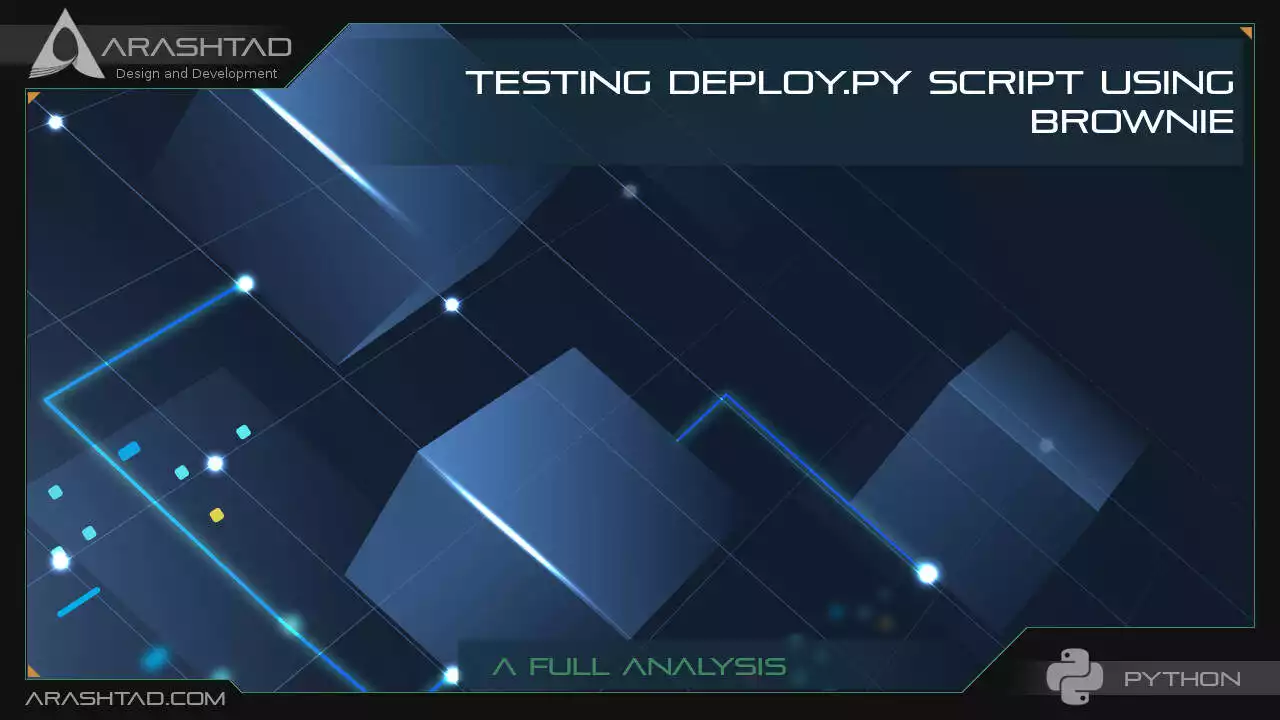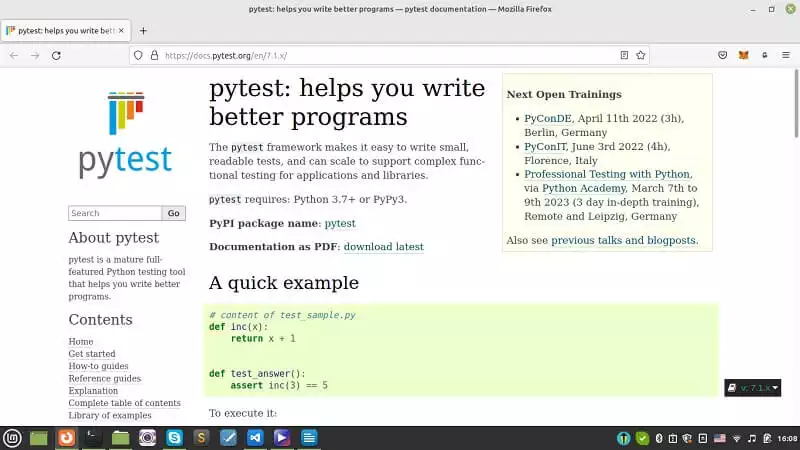Testing Deploy.py Script Using Brownie: A Full Analysis
In this post, we will complete testing our deploy.py script using Brownie in more detail so that we can see if there is any problem at all. And if there is, we can analyze it in more detail. This kind of detailed test and code analysis becomes handy, especially when the code is too long and complex that we cannot so easily understand where the unexpected result originates from.
Detailed Testing Deploy.py Using Brownie
For more detailed testing, we can write in the terminal:
brownie test -k Which in our case will be:
brownie test -k test_updating_storage
And the result will be:
Brownie v1.18.1 - Python development framework for Ethereum===================================================== test session starts =====================================================
platform linux -- Python 3.8.10, pytest-6.2.5, py-1.11.0, pluggy-1.0.0
rootdir: /home/mohamad/Desktop/solidity/Solidity and web3 codes/brownie_simple_storage
plugins: eth-brownie-1.18.1, web3-5.27.0, xdist-1.34.0, forked-1.4.0, hypothesis-6.27.3
collected 2 items / 1 deselected / 1 selectedLaunching 'ganache-cli --chain.vmErrorsOnRPCResponse true --server.port 8545 --miner.blockGasLimit 12000000 --wallet.totalAccounts 10 --hardfork istanbul --wallet.mnemonic brownie'...tests/test_simple_storage.py . [100%]=============================================== 1 passed, 1 deselected in 1.85s ===============================================
Terminating local RPC client...
And if we write anything wrong in our code, by running:
brownie test --pdb
In the terminal, we will see:
Brownie v1.18.1 - Python development framework for Ethereum===================================================== test session starts =====================================================
platform linux -- Python 3.8.10, pytest-6.2.5, py-1.11.0, pluggy-1.0.0
rootdir: /home/mohamad/Desktop/solidity/Solidity and web3 codes/brownie_simple_storage
plugins: eth-brownie-1.18.1, web3-5.27.0, xdist-1.34.0, forked-1.4.0, hypothesis-6.27.3
collected 2 itemsLaunching 'ganache-cli --chain.vmErrorsOnRPCResponse true --server.port 8545 --miner.blockGasLimit 12000000 --wallet.totalAccounts 10 --hardfork istanbul --wallet.mnemonic brownie'...tests/test_simple_storage.py F
>>>>>>>>>>>>>>>>>>>>>>>>>>>>>>>>>>>>>>>>>>>>>>>>>>>>>>>>>> traceback >>>>>>>>>>>>>>>>>>>>>>>>>>>>>>>>>>>>>>>>>>>>>>>>>>>>>>>>>>def test_deploy():
account = accounts[0]
simple_storage = SimpleStorage.deploy({"from": account})
starting_value = simple_storage.retrieve()
expected = 38
> assert starting_value == expected
E assert 0 == 38tests/test_simple_storage.py:10: AssertionError
>>>>>>>>>>>>>>>>>>>>>>>>>>>>>>>>>>>>>>>>>>>>>>>>>>>>>>>> entering PDB >>>>>>>>>>>>>>>>>>>>>>>>>>>>>>>>>>>>>>>>>>>>>>>>>>>>>>>>>>>>>>>>>>>>>>>>>>>>>>>>>>>>>>>>>>>>>>>>>>> PDB post_mortem (IO-capturing turned off) >>>>>>>>>>>>>>>>>>>>>>>>>>>>>>>>>>>>>>>>>>
> /home/mohamad/Desktop/solidity/Solidity and web3 codes/brownie_simple_storage/tests/test_simple_storage.py(10)test_deploy()
-> assert starting_value == expected
This shows that in the first function we mistakenly expected the stored value to be 38 which was 0 at first. We can also do some sort of debugging next to PDB in the terminal for example we can write:
(Pdb) expected>> 38
Which shows 38 as the number stored in expected, or:
(Pdb) simple_storage.retrieve()>>0
By understanding the difference between the expected number and the retrieved one, we will be able to debug the code.
(Pdb) simple_storage
The better way to fully understand the problems and be able to find it, is to type in the terminal:
brownie test -s
Brownie v1.18.1 - Python development framework for Ethereum===================================================== test session starts =====================================================
platform linux -- Python 3.8.10, pytest-6.2.5, py-1.11.0, pluggy-1.0.0 -- /home/mohamad/.local/pipx/venvs/eth-brownie/bin/python
cachedir: .pytest_cache
hypothesis profile 'brownie-verbose' -> verbosity=2, deadline=None, max_examples=50, stateful_step_count=10, report_multiple_bugs=False, database=DirectoryBasedExampleDatabase(PosixPath('/home/mohamad/.brownie/hypothesis'))
rootdir: /home/mohamad/Desktop/solidity/Solidity and web3 codes/brownie_simple_storage
plugins: eth-brownie-1.18.1, web3-5.27.0, xdist-1.34.0, forked-1.4.0, hypothesis-6.27.3
collected 2 itemsLaunching 'ganache-cli --chain.vmErrorsOnRPCResponse true --server.port 8545 --miner.blockGasLimit 12000000 --wallet.totalAccounts 10 --hardfork istanbul --wallet.mnemonic brownie'...tests/test_simple_storage.py::test_deploy FAILED
tests/test_simple_storage.py::test_updating_storage PASSED========================================================== FAILURES ===========================================================
_________________________________________________________ test_deploy _________________________________________________________def test_deploy():
account = accounts[0]
simple_storage = SimpleStorage.deploy({"from": account})
starting_value = simple_storage.retrieve()
expected = 38
> assert starting_value == expected
E assert 0 == 38
E +0
E -38tests/test_simple_storage.py:10: AssertionError
=================================================== short test summary info ===================================================
FAILED tests/test_simple_storage.py::test_deploy - assert 0 == 38
================================================= 1 failed, 1 passed in 1.94s =================================================
Terminating local RPC client…
As you can see in the result, the code and its variables are fully analyzed.
Fixing the Code
Now if we fix our code and change the expected in the first function to 0:
from brownie import SimpleStorage, accounts
def test_deploy():
account = accounts[0]
simple_storage = SimpleStorage.deploy({"from": account})
starting_value = simple_storage.retrieve()
expected = 0
assert starting_value == expected
def test_updating_storage():
account = accounts[0]
simple_storage = SimpleStorage.deploy({"from": account})
expected = 38
simple_storage.store(expected,{"from":account})
assert expected == simple_storage.retrieve()
And test our deployment again:
brownie test -s
We will see:
rownie v1.18.1 - Python development framework for Ethereum===================================================== test session starts =====================================================
platform linux -- Python 3.8.10, pytest-6.2.5, py-1.11.0, pluggy-1.0.0 -- /home/mohamad/.local/pipx/venvs/eth-brownie/bin/python
cachedir: .pytest_cache
hypothesis profile 'brownie-verbose' -> verbosity=2, deadline=None, max_examples=50, stateful_step_count=10, report_multiple_bugs=False, database=DirectoryBasedExampleDatabase(PosixPath('/home/mohamad/.brownie/hypothesis'))
rootdir: /home/mohamad/Desktop/solidity/Solidity and web3 codes/brownie_simple_storage
plugins: eth-brownie-1.18.1, web3-5.27.0, xdist-1.34.0, forked-1.4.0, hypothesis-6.27.3
collected 2 itemsLaunching 'ganache-cli --chain.vmErrorsOnRPCResponse true --server.port 8545 --miner.blockGasLimit 12000000 --wallet.totalAccounts 10 --hardfork istanbul --wallet.mnemonic brownie'...tests/test_simple_storage.py::test_deploy PASSED
tests/test_simple_storage.py::test_updating_storage PASSED====================================================== 2 passed in 2.08s ======================================================
Terminating local RPC client...
Brownie test uses the functions in the Pytest module and you can use more functions than mentioned here to be able to have all different kinds of analysis on your smart contract deployment.
What We Achieved through Testing Deploy.py Using Brownie
In this article, we’ve completed testing the deployments of the smart contracts (deploy.py script) using Brownie in more detail, so that we can see if there is any problem at all and if there is, we can analyze it in more detail. This kind of detailed test and code analysis becomes handy, especially when the code is too long and complex that we cannot so easily understand where the unexpected result originates from.
Download this Article in PDF format

What Do We Do in Arashtad?
3D websites, 3D games, metaverses, and other types of WebGL and 3D applications are what we develop in our 3D web development team.


